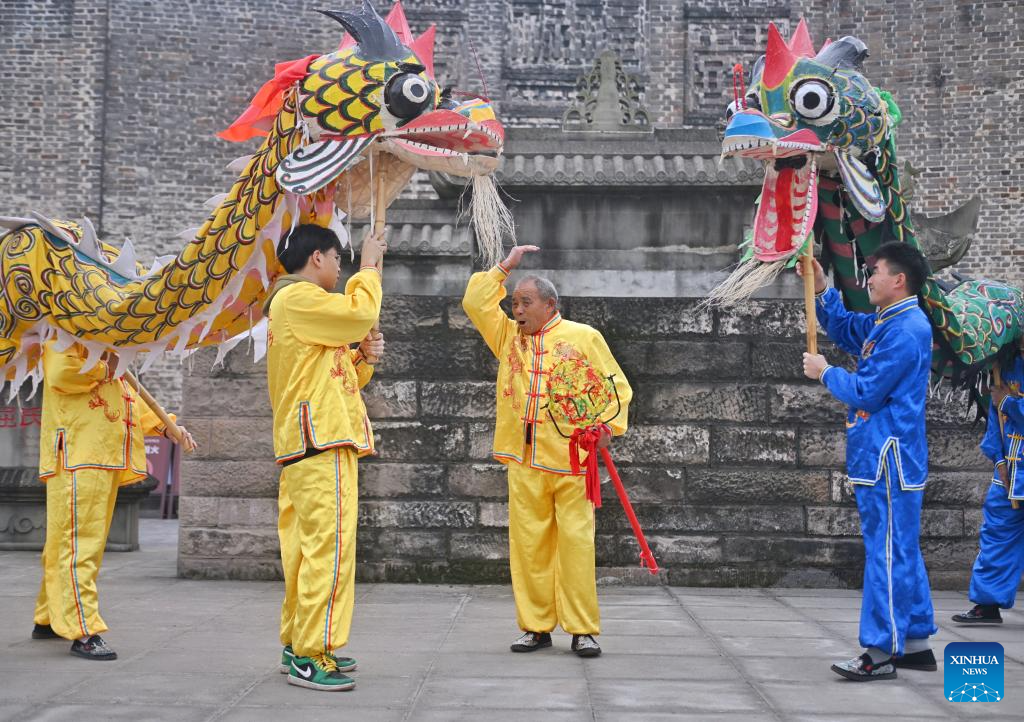
Luo Deshu (C) guides youngsters to perform Yutan Dragon Dance in Fangdong Town, Luxian County of southwest China's Sichuan Province, Feb. 1, 2024. Yutan Dragon Dance, a traditional Chinese dragon dance in Luxian County of southwest China's Sichuan Province, is performed by local people to pray for good weather and harvest since the ancient time. In 2006, it was listed as a national-level intangible cultural heritage.
Luo Deshu, 75, is an inheritor of the Yutan Dragon Dance. Luo started to learn the folk art since four years old. He not only inherits the performing skills from his father Luo Yinkun but also integrates acrobatics and other performing styles into the dragon dance.
"The essence of the dragon dance is vividness, which demands the performer to coordinate his eyes, hands, feet with his mind, " said Luo.
Nowadays, Luo teaches dragon dance at primary schools every week. He also plans to set up a Yutan Dragon Dance team for regular performances, aiming to better promote the Chinese dragon culture. (Xinhua/Liu Kun)
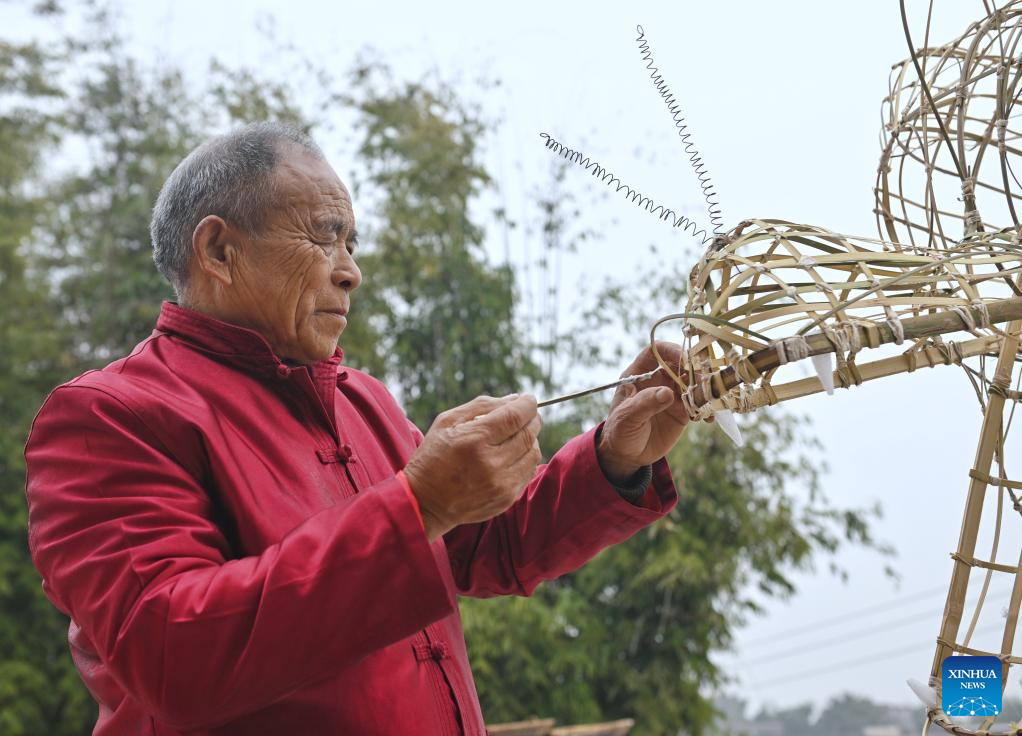
Luo Deshu makes the framework of a dragon in Fangdong Town, Luxian County of southwest China's Sichuan Province, Feb. 1, 2024. Yutan Dragon Dance, a traditional Chinese dragon dance in Luxian County of southwest China's Sichuan Province, is performed by local people to pray for good weather and harvest since the ancient time. In 2006, it was listed as a national-level intangible cultural heritage.
Luo Deshu, 75, is an inheritor of the Yutan Dragon Dance. Luo started to learn the folk art since four years old. He not only inherits the performing skills from his father Luo Yinkun but also integrates acrobatics and other performing styles into the dragon dance.
"The essence of the dragon dance is vividness, which demands the performer to coordinate his eyes, hands, feet with his mind, " said Luo.
Nowadays, Luo teaches dragon dance at primary schools every week. He also plans to set up a Yutan Dragon Dance team for regular performances, aiming to better promote the Chinese dragon culture. (Xinhua/Liu Kun)
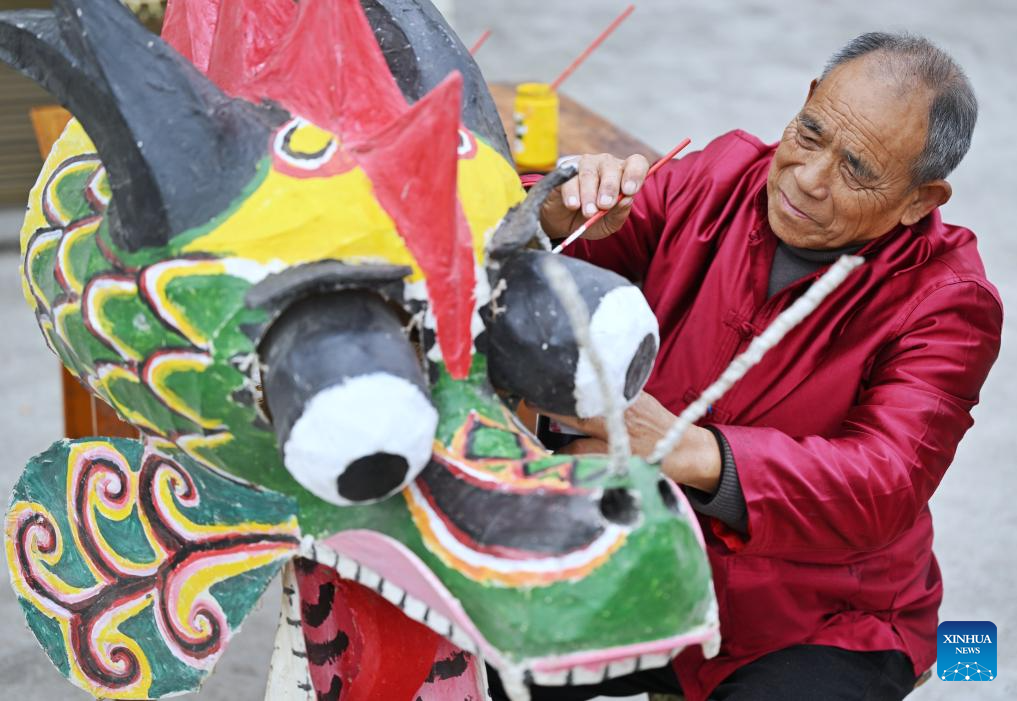
Luo Deshu paints the head of a dragon in Fangdong Town, Luxian County of southwest China's Sichuan Province, Feb. 1, 2024. Yutan Dragon Dance, a traditional Chinese dragon dance in Luxian County of southwest China's Sichuan Province, is performed by local people to pray for good weather and harvest since the ancient time. In 2006, it was listed as a national-level intangible cultural heritage.
Luo Deshu, 75, is an inheritor of the Yutan Dragon Dance. Luo started to learn the folk art since four years old. He not only inherits the performing skills from his father Luo Yinkun but also integrates acrobatics and other performing styles into the dragon dance.
"The essence of the dragon dance is vividness, which demands the performer to coordinate his eyes, hands, feet with his mind, " said Luo.
Nowadays, Luo teaches dragon dance at primary schools every week. He also plans to set up a Yutan Dragon Dance team for regular performances, aiming to better promote the Chinese dragon culture. (Xinhua/Liu Kun)
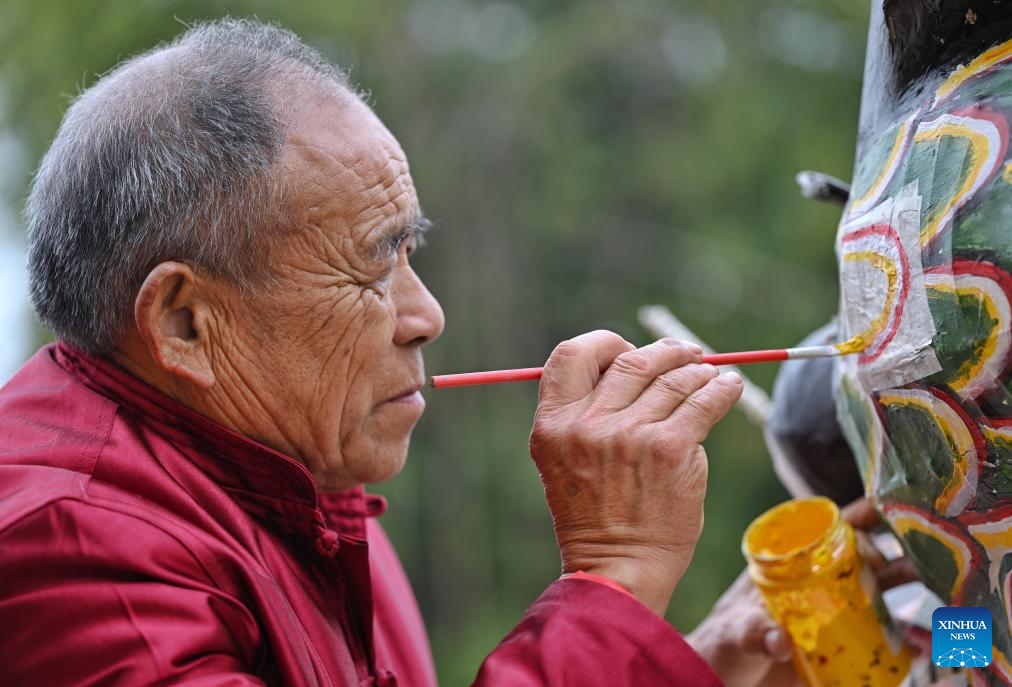
Luo Deshu paints the head of a dragon in Fangdong Town, Luxian County of southwest China's Sichuan Province, Feb. 1, 2024. Yutan Dragon Dance, a traditional Chinese dragon dance in Luxian County of southwest China's Sichuan Province, is performed by local people to pray for good weather and harvest since the ancient time. In 2006, it was listed as a national-level intangible cultural heritage.
Luo Deshu, 75, is an inheritor of the Yutan Dragon Dance. Luo started to learn the folk art since four years old. He not only inherits the performing skills from his father Luo Yinkun but also integrates acrobatics and other performing styles into the dragon dance.
"The essence of the dragon dance is vividness, which demands the performer to coordinate his eyes, hands, feet with his mind, " said Luo.
Nowadays, Luo teaches dragon dance at primary schools every week. He also plans to set up a Yutan Dragon Dance team for regular performances, aiming to better promote the Chinese dragon culture. (Xinhua/Liu Kun)
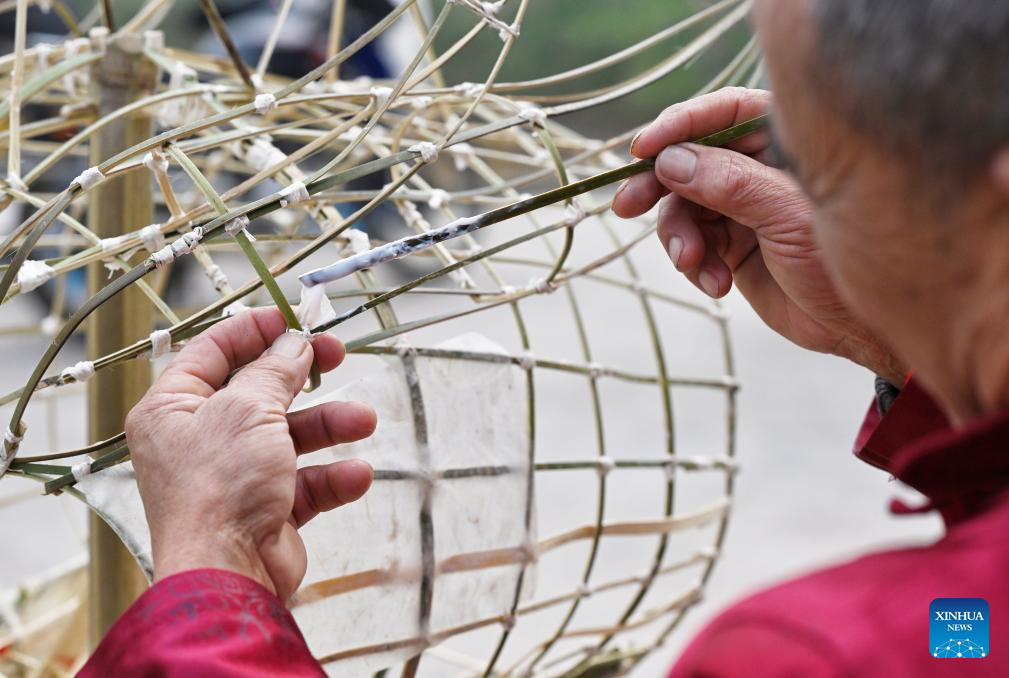
Luo Deshu makes the framework of a dragon in Fangdong Town, Luxian County of southwest China's Sichuan Province, Feb. 1, 2024. Yutan Dragon Dance, a traditional Chinese dragon dance in Luxian County of southwest China's Sichuan Province, is performed by local people to pray for good weather and harvest since the ancient time. In 2006, it was listed as a national-level intangible cultural heritage.
Luo Deshu, 75, is an inheritor of the Yutan Dragon Dance. Luo started to learn the folk art since four years old. He not only inherits the performing skills from his father Luo Yinkun but also integrates acrobatics and other performing styles into the dragon dance.
"The essence of the dragon dance is vividness, which demands the performer to coordinate his eyes, hands, feet with his mind, " said Luo.
Nowadays, Luo teaches dragon dance at primary schools every week. He also plans to set up a Yutan Dragon Dance team for regular performances, aiming to better promote the Chinese dragon culture. (Xinhua/Liu Kun)

Luo Deshu (C) poses for a photo with his Yutan Dragon Dance team members in Fangdong Town, Luxian County of southwest China's Sichuan Province, Feb. 1, 2024. Yutan Dragon Dance, a traditional Chinese dragon dance in Luxian County of southwest China's Sichuan Province, is performed by local people to pray for good weather and harvest since the ancient time. In 2006, it was listed as a national-level intangible cultural heritage.
Luo Deshu, 75, is an inheritor of the Yutan Dragon Dance. Luo started to learn the folk art since four years old. He not only inherits the performing skills from his father Luo Yinkun but also integrates acrobatics and other performing styles into the dragon dance.
"The essence of the dragon dance is vividness, which demands the performer to coordinate his eyes, hands, feet with his mind, " said Luo.
Nowadays, Luo teaches dragon dance at primary schools every week. He also plans to set up a Yutan Dragon Dance team for regular performances, aiming to better promote the Chinese dragon culture. (Xinhua/Liu Kun)

An aerial drone photo taken on Feb. 1, 2024 shows Luo Deshu performing Yutan Dragon Dance with his team members in Fangdong Town, Luxian County of southwest China's Sichuan Province. Yutan Dragon Dance, a traditional Chinese dragon dance in Luxian County of southwest China's Sichuan Province, is performed by local people to pray for good weather and harvest since the ancient time. In 2006, it was listed as a national-level intangible cultural heritage.
Luo Deshu, 75, is an inheritor of the Yutan Dragon Dance. Luo started to learn the folk art since four years old. He not only inherits the performing skills from his father Luo Yinkun but also integrates acrobatics and other performing styles into the dragon dance.
"The essence of the dragon dance is vividness, which demands the performer to coordinate his eyes, hands, feet with his mind, " said Luo.
Nowadays, Luo teaches dragon dance at primary schools every week. He also plans to set up a Yutan Dragon Dance team for regular performances, aiming to better promote the Chinese dragon culture. (Xinhua/Liu Kun)

Luo Deshu cuts papers to make the head of a dragon in Fangdong Town, Luxian County of southwest China's Sichuan Province, Feb. 1, 2024. Yutan Dragon Dance, a traditional Chinese dragon dance in Luxian County of southwest China's Sichuan Province, is performed by local people to pray for good weather and harvest since the ancient time. In 2006, it was listed as a national-level intangible cultural heritage.
Luo Deshu, 75, is an inheritor of the Yutan Dragon Dance. Luo started to learn the folk art since four years old. He not only inherits the performing skills from his father Luo Yinkun but also integrates acrobatics and other performing styles into the dragon dance.
"The essence of the dragon dance is vividness, which demands the performer to coordinate his eyes, hands, feet with his mind, " said Luo.
Nowadays, Luo teaches dragon dance at primary schools every week. He also plans to set up a Yutan Dragon Dance team for regular performances, aiming to better promote the Chinese dragon culture. (Xinhua/Liu Kun)
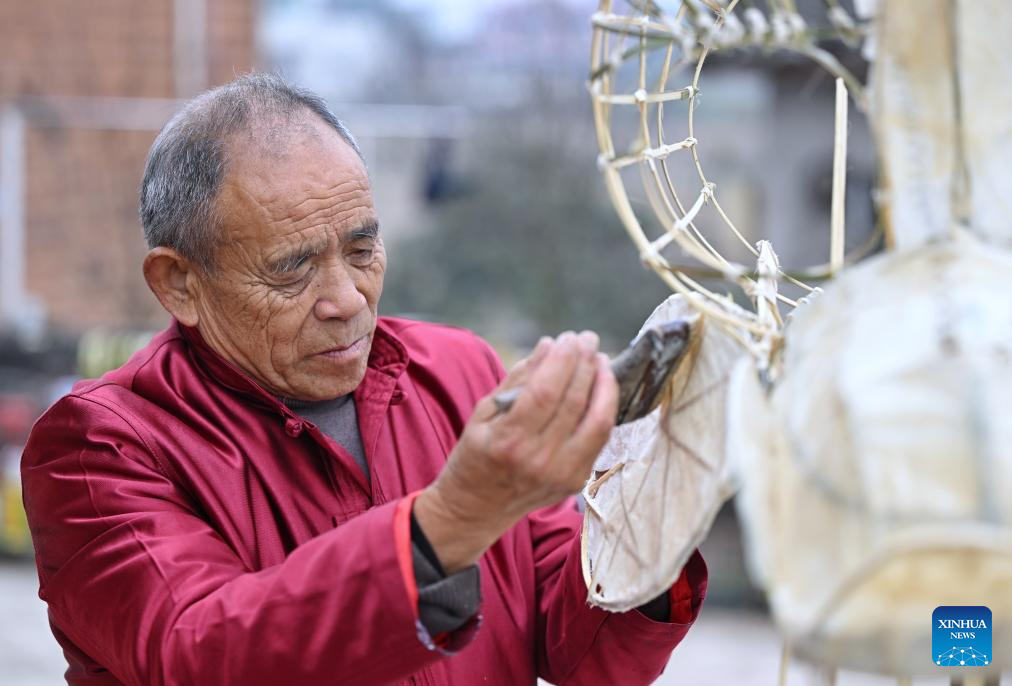
Luo Deshu makes the head of a dragon in Fangdong Town, Luxian County of southwest China's Sichuan Province, Feb. 1, 2024. Yutan Dragon Dance, a traditional Chinese dragon dance in Luxian County of southwest China's Sichuan Province, is performed by local people to pray for good weather and harvest since the ancient time. In 2006, it was listed as a national-level intangible cultural heritage.
Luo Deshu, 75, is an inheritor of the Yutan Dragon Dance. Luo started to learn the folk art since four years old. He not only inherits the performing skills from his father Luo Yinkun but also integrates acrobatics and other performing styles into the dragon dance.
"The essence of the dragon dance is vividness, which demands the performer to coordinate his eyes, hands, feet with his mind, " said Luo.
Nowadays, Luo teaches dragon dance at primary schools every week. He also plans to set up a Yutan Dragon Dance team for regular performances, aiming to better promote the Chinese dragon culture. (Xinhua/Liu Kun)
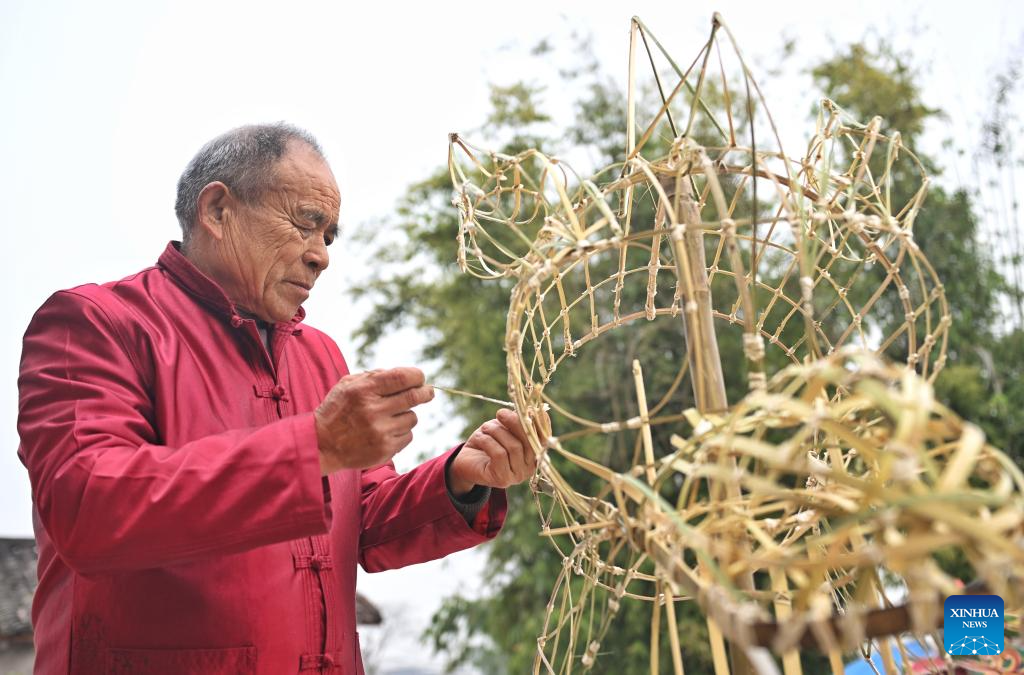
Luo Deshu makes the framework of a dragon in Fangdong Town, Luxian County of southwest China's Sichuan Province, Feb. 1, 2024. Yutan Dragon Dance, a traditional Chinese dragon dance in Luxian County of southwest China's Sichuan Province, is performed by local people to pray for good weather and harvest since the ancient time. In 2006, it was listed as a national-level intangible cultural heritage.
Luo Deshu, 75, is an inheritor of the Yutan Dragon Dance. Luo started to learn the folk art since four years old. He not only inherits the performing skills from his father Luo Yinkun but also integrates acrobatics and other performing styles into the dragon dance.
"The essence of the dragon dance is vividness, which demands the performer to coordinate his eyes, hands, feet with his mind, " said Luo.
Nowadays, Luo teaches dragon dance at primary schools every week. He also plans to set up a Yutan Dragon Dance team for regular performances, aiming to better promote the Chinese dragon culture. (Xinhua/Liu Kun)

Luo Deshu (front) performs Yutan Dragon Dance with his team members in Fangdong Town, Luxian County of southwest China's Sichuan Province, Feb. 1, 2024. Yutan Dragon Dance, a traditional Chinese dragon dance in Luxian County of southwest China's Sichuan Province, is performed by local people to pray for good weather and harvest since the ancient time. In 2006, it was listed as a national-level intangible cultural heritage.
Luo Deshu, 75, is an inheritor of the Yutan Dragon Dance. Luo started to learn the folk art since four years old. He not only inherits the performing skills from his father Luo Yinkun but also integrates acrobatics and other performing styles into the dragon dance.
"The essence of the dragon dance is vividness, which demands the performer to coordinate his eyes, hands, feet with his mind, " said Luo.
Nowadays, Luo teaches dragon dance at primary schools every week. He also plans to set up a Yutan Dragon Dance team for regular performances, aiming to better promote the Chinese dragon culture. (Xinhua/Liu Kun)
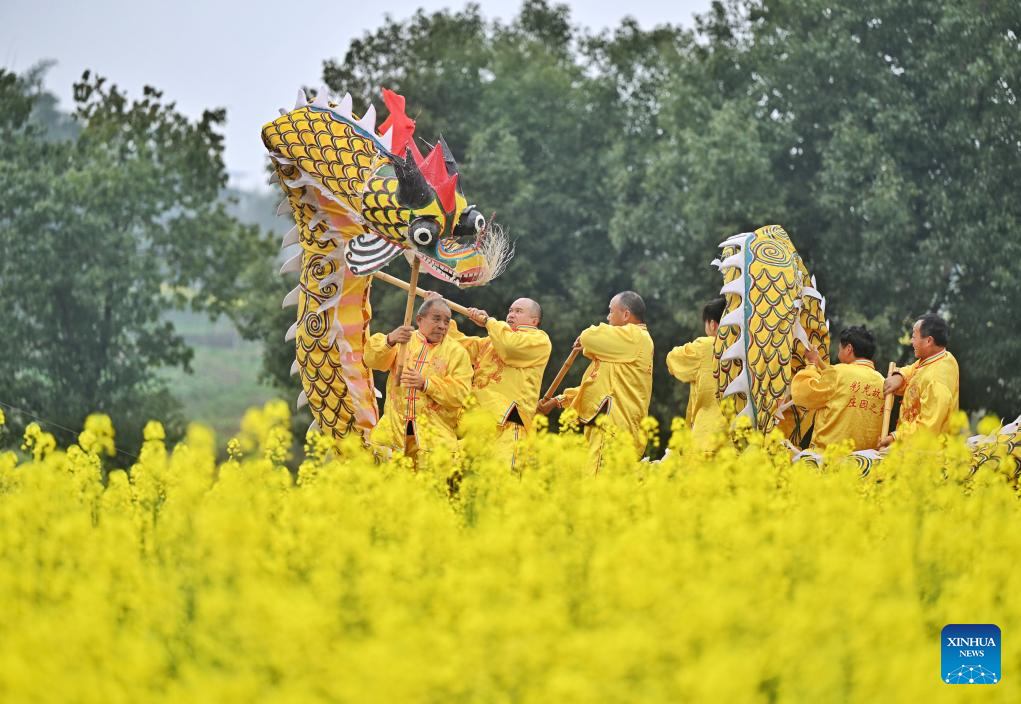
Luo Deshu (1st L) performs Yutan Dragon Dance with his team members in Fangdong Town, Luxian County of southwest China's Sichuan Province, Feb. 1, 2024. Yutan Dragon Dance, a traditional Chinese dragon dance in Luxian County of southwest China's Sichuan Province, is performed by local people to pray for good weather and harvest since the ancient time. In 2006, it was listed as a national-level intangible cultural heritage.
Luo Deshu, 75, is an inheritor of the Yutan Dragon Dance. Luo started to learn the folk art since four years old. He not only inherits the performing skills from his father Luo Yinkun but also integrates acrobatics and other performing styles into the dragon dance.
"The essence of the dragon dance is vividness, which demands the performer to coordinate his eyes, hands, feet with his mind, " said Luo.
Nowadays, Luo teaches dragon dance at primary schools every week. He also plans to set up a Yutan Dragon Dance team for regular performances, aiming to better promote the Chinese dragon culture. (Xinhua/Liu Kun)
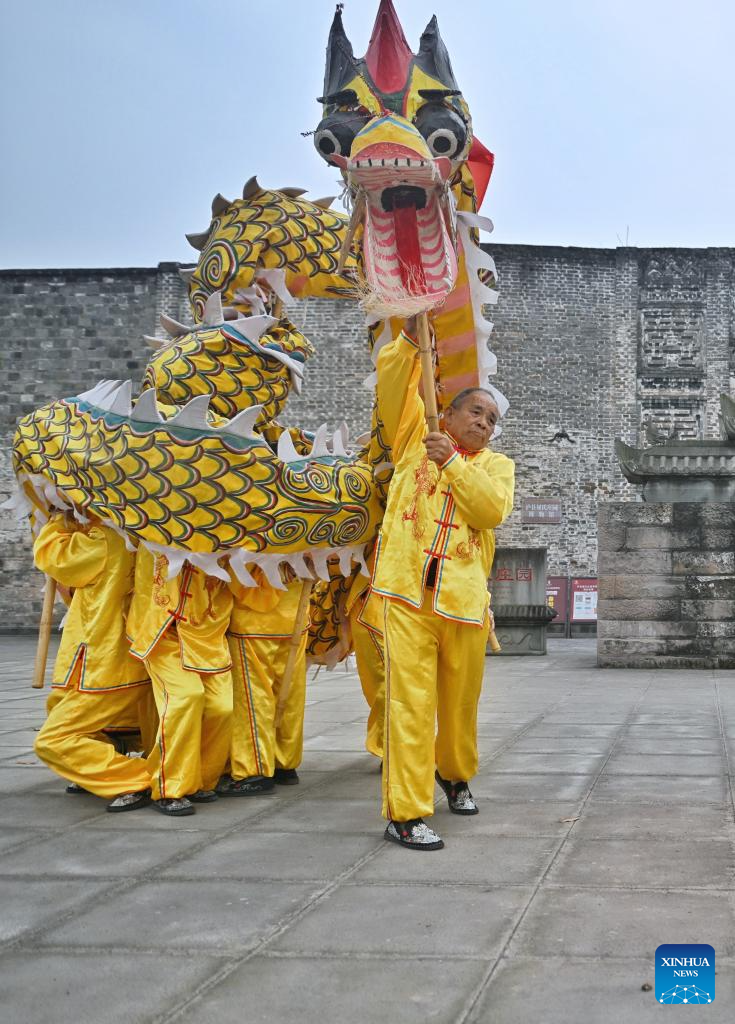
Luo Deshu performs Yutan Dragon Dance with his team members in Fangdong Town, Luxian County of southwest China's Sichuan Province, Feb. 1, 2024. Yutan Dragon Dance, a traditional Chinese dragon dance in Luxian County of southwest China's Sichuan Province, is performed by local people to pray for good weather and harvest since the ancient time. In 2006, it was listed as a national-level intangible cultural heritage.
Luo Deshu, 75, is an inheritor of the Yutan Dragon Dance. Luo started to learn the folk art since four years old. He not only inherits the performing skills from his father Luo Yinkun but also integrates acrobatics and other performing styles into the dragon dance.
"The essence of the dragon dance is vividness, which demands the performer to coordinate his eyes, hands, feet with his mind, " said Luo.
Nowadays, Luo teaches dragon dance at primary schools every week. He also plans to set up a Yutan Dragon Dance team for regular performances, aiming to better promote the Chinese dragon culture. (Xinhua/Liu Kun)
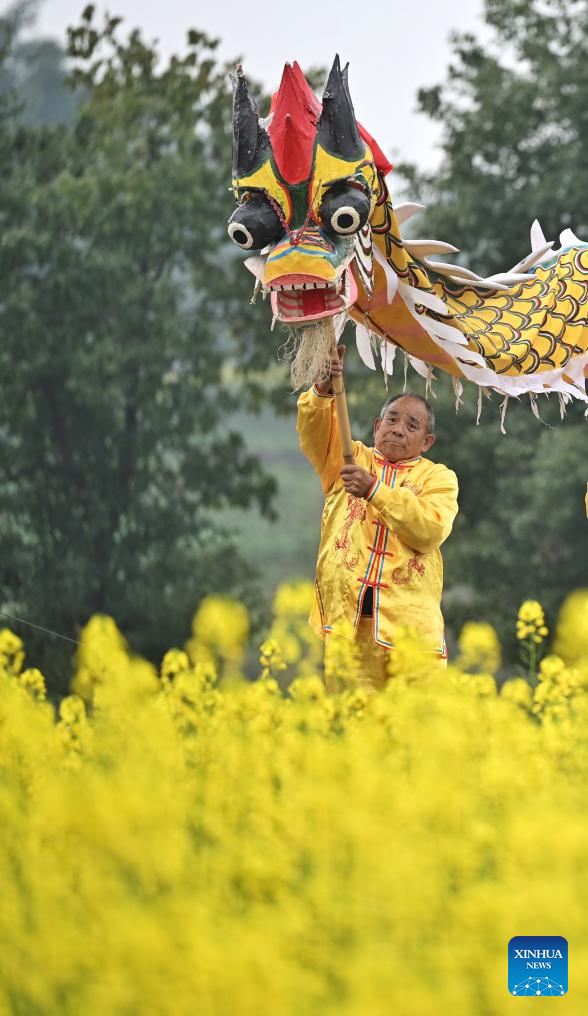
Luo Deshu performs Yutan Dragon Dance with his team members in Fangdong Town, Luxian County of southwest China's Sichuan Province, Feb. 1, 2024. Yutan Dragon Dance, a traditional Chinese dragon dance in Luxian County of southwest China's Sichuan Province, is performed by local people to pray for good weather and harvest since the ancient time. In 2006, it was listed as a national-level intangible cultural heritage.
Luo Deshu, 75, is an inheritor of the Yutan Dragon Dance. Luo started to learn the folk art since four years old. He not only inherits the performing skills from his father Luo Yinkun but also integrates acrobatics and other performing styles into the dragon dance.
"The essence of the dragon dance is vividness, which demands the performer to coordinate his eyes, hands, feet with his mind, " said Luo.
Nowadays, Luo teaches dragon dance at primary schools every week. He also plans to set up a Yutan Dragon Dance team for regular performances, aiming to better promote the Chinese dragon culture. (Xinhua/Liu Kun)

Luo Deshu (front) performs Yutan Dragon Dance with his team members in Fangdong Town, Luxian County of southwest China's Sichuan Province, Feb. 1, 2024. Yutan Dragon Dance, a traditional Chinese dragon dance in Luxian County of southwest China's Sichuan Province, is performed by local people to pray for good weather and harvest since the ancient time. In 2006, it was listed as a national-level intangible cultural heritage.
Luo Deshu, 75, is an inheritor of the Yutan Dragon Dance. Luo started to learn the folk art since four years old. He not only inherits the performing skills from his father Luo Yinkun but also integrates acrobatics and other performing styles into the dragon dance.
"The essence of the dragon dance is vividness, which demands the performer to coordinate his eyes, hands, feet with his mind, " said Luo.
Nowadays, Luo teaches dragon dance at primary schools every week. He also plans to set up a Yutan Dragon Dance team for regular performances, aiming to better promote the Chinese dragon culture. (Xinhua/Liu Kun)

Luo Deshu paints the head of a dragon in Fangdong Town, Luxian County of southwest China's Sichuan Province, Feb. 1, 2024. Yutan Dragon Dance, a traditional Chinese dragon dance in Luxian County of southwest China's Sichuan Province, is performed by local people to pray for good weather and harvest since the ancient time. In 2006, it was listed as a national-level intangible cultural heritage.
Luo Deshu, 75, is an inheritor of the Yutan Dragon Dance. Luo started to learn the folk art since four years old. He not only inherits the performing skills from his father Luo Yinkun but also integrates acrobatics and other performing styles into the dragon dance.
"The essence of the dragon dance is vividness, which demands the performer to coordinate his eyes, hands, feet with his mind, " said Luo.
Nowadays, Luo teaches dragon dance at primary schools every week. He also plans to set up a Yutan Dragon Dance team for regular performances, aiming to better promote the Chinese dragon culture. (Xinhua/Liu Kun)
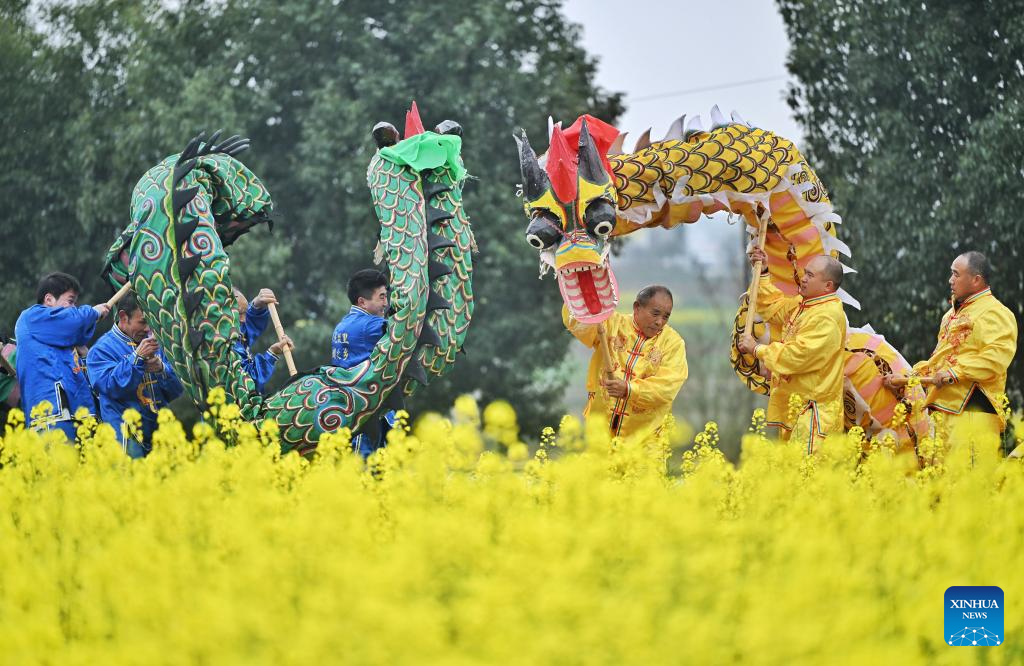
Luo Deshu (3rd R) performs Yutan Dragon Dance with his team members in Fangdong Town, Luxian County of southwest China's Sichuan Province, Feb. 1, 2024. Yutan Dragon Dance, a traditional Chinese dragon dance in Luxian County of southwest China's Sichuan Province, is performed by local people to pray for good weather and harvest since the ancient time. In 2006, it was listed as a national-level intangible cultural heritage.
Luo Deshu, 75, is an inheritor of the Yutan Dragon Dance. Luo started to learn the folk art since four years old. He not only inherits the performing skills from his father Luo Yinkun but also integrates acrobatics and other performing styles into the dragon dance.
"The essence of the dragon dance is vividness, which demands the performer to coordinate his eyes, hands, feet with his mind, " said Luo.
Nowadays, Luo teaches dragon dance at primary schools every week. He also plans to set up a Yutan Dragon Dance team for regular performances, aiming to better promote the Chinese dragon culture. (Xinhua/Liu Kun)
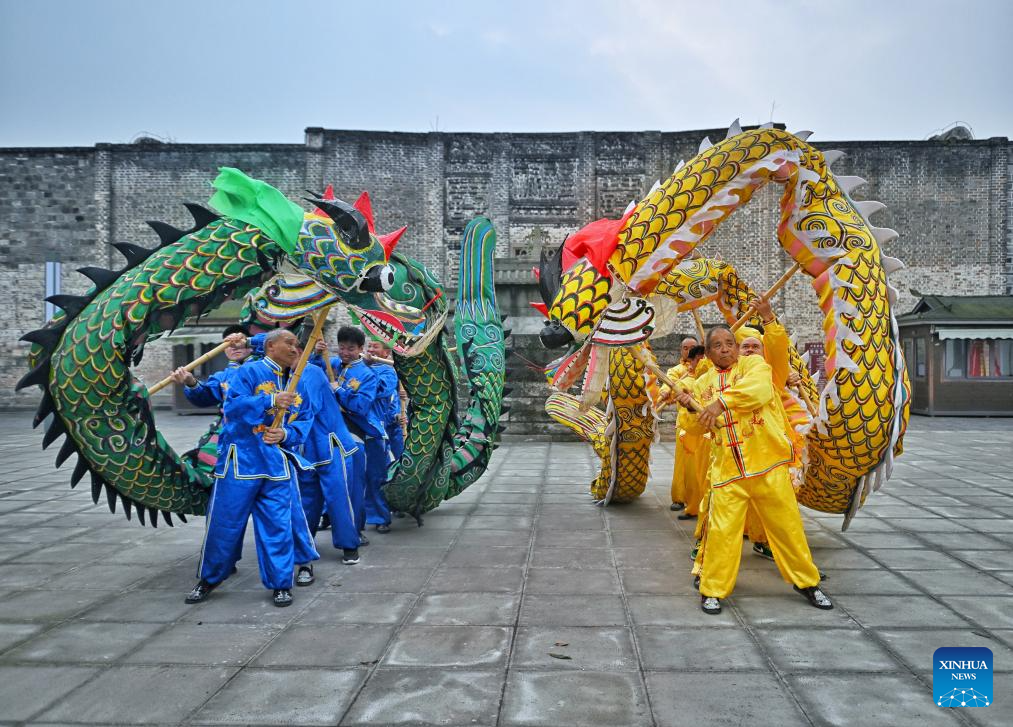
Luo Deshu (R, front) performs Yutan Dragon Dance with his team members in Fangdong Town, Luxian County of southwest China's Sichuan Province, Feb. 1, 2024. Yutan Dragon Dance, a traditional Chinese dragon dance in Luxian County of southwest China's Sichuan Province, is performed by local people to pray for good weather and harvest since the ancient time. In 2006, it was listed as a national-level intangible cultural heritage.
Luo Deshu, 75, is an inheritor of the Yutan Dragon Dance. Luo started to learn the folk art since four years old. He not only inherits the performing skills from his father Luo Yinkun but also integrates acrobatics and other performing styles into the dragon dance.
"The essence of the dragon dance is vividness, which demands the performer to coordinate his eyes, hands, feet with his mind, " said Luo.
Nowadays, Luo teaches dragon dance at primary schools every week. He also plans to set up a Yutan Dragon Dance team for regular performances, aiming to better promote the Chinese dragon culture. (Xinhua/Liu Kun)
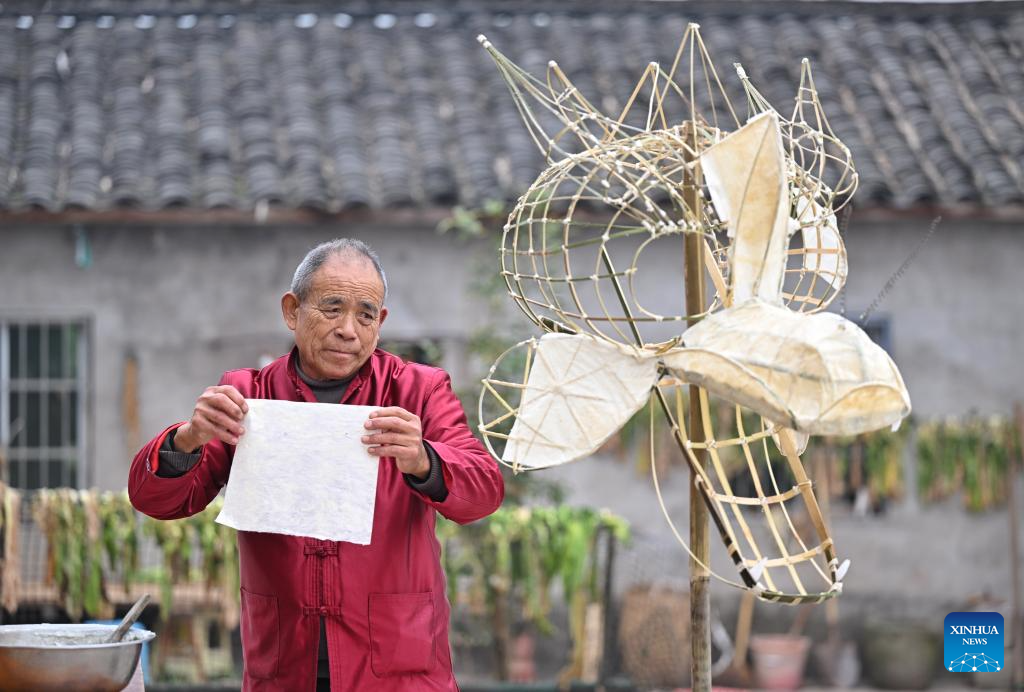
Luo Deshu makes the head of a dragon in Fangdong Town, Luxian County of southwest China's Sichuan Province, Feb. 1, 2024. Yutan Dragon Dance, a traditional Chinese dragon dance in Luxian County of southwest China's Sichuan Province, is performed by local people to pray for good weather and harvest since the ancient time. In 2006, it was listed as a national-level intangible cultural heritage.
Luo Deshu, 75, is an inheritor of the Yutan Dragon Dance. Luo started to learn the folk art since four years old. He not only inherits the performing skills from his father Luo Yinkun but also integrates acrobatics and other performing styles into the dragon dance.
"The essence of the dragon dance is vividness, which demands the performer to coordinate his eyes, hands, feet with his mind, " said Luo.
Nowadays, Luo teaches dragon dance at primary schools every week. He also plans to set up a Yutan Dragon Dance team for regular performances, aiming to better promote the Chinese dragon culture. (Xinhua/Liu Kun)
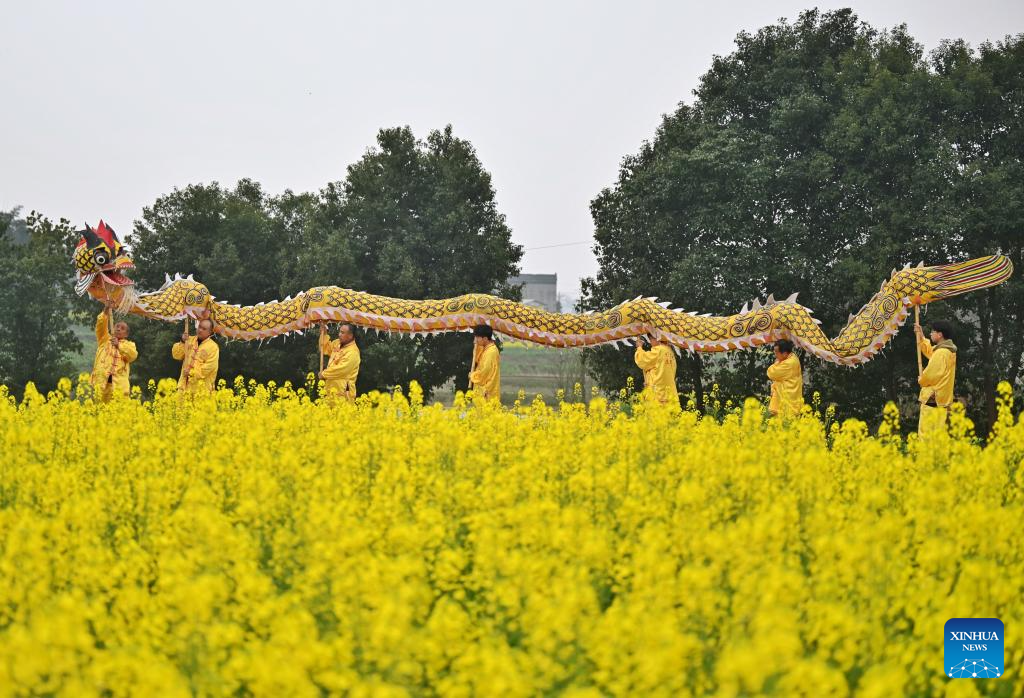
Luo Deshu (1st L) performs Yutan Dragon Dance with his team members in Fangdong Town, Luxian County of southwest China's Sichuan Province, Feb. 1, 2024. Yutan Dragon Dance, a traditional Chinese dragon dance in Luxian County of southwest China's Sichuan Province, is performed by local people to pray for good weather and harvest since the ancient time. In 2006, it was listed as a national-level intangible cultural heritage.
Luo Deshu, 75, is an inheritor of the Yutan Dragon Dance. Luo started to learn the folk art since four years old. He not only inherits the performing skills from his father Luo Yinkun but also integrates acrobatics and other performing styles into the dragon dance.
"The essence of the dragon dance is vividness, which demands the performer to coordinate his eyes, hands, feet with his mind, " said Luo.
Nowadays, Luo teaches dragon dance at primary schools every week. He also plans to set up a Yutan Dragon Dance team for regular performances, aiming to better promote the Chinese dragon culture. (Xinhua/Liu Kun)



